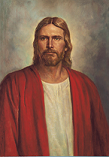| Answers portal
|
| Mormon FAQ
|

|
 RESOURCES RESOURCES
|
|
|
 PERSPECTIVES PERSPECTIVES
|
 MEDIA MEDIA
|
 OTHER USEFUL SITES OTHER USEFUL SITES
|
|
|
For the official declaration of the LDS beliefs and practices, go to Mormon.org.
Summary of Beliefs
Members of the Church believe that God is a loving Heavenly Father and that Jesus Christ is our Lord and Savior. The Holy Bible is used as a principal book of scripture, with most English members favoring the King James version.
The Latter-day Saints consider themselves Christians, and find it extremely offensive to be told that they are not "real" Christians or that they don't believe in Jesus Christ's divinity. The Church is neither Catholic or Protestant, however, being a restoration rather than a reformation of an existing church.
Some of the beliefs that differentiate the Church from other churches include:
- Modern-day revelation and modern-day prophets
- Starting with Joseph Smith in 1830, the Church has a prophet that leads the church. The prophet may produce new scripture, help administer the Church, and generally gives counsel and guidance. There is no no expectation of "prophetic infallibility," and official acts and doctrine require the assent of fifteen Church leaders: the prophet, his two counselors, and the Twelve Apostles. There is also a strong belief in receiving revelation "line up line." We—meaning the membership and the prophet—learn only what we are able to apply in our lives. Free agency also plays a big role and everyone is free to choose to follow or not to follow.
- Apostasy and Restoration
- Mormons believe that Jesus established a church on the earth. As the Apostles were killed, there was a loss of authority in the Church. While there were are and are many great and inspired believers in many denominations, the authority to act in God's name, and the fulness of many teachings, were lost and had to be restored.
- The Holy Bible
- Members of the Church believe that the Bible is the word of God, but recognize that God's word was written down and transmitted by fallible mortals. As such, no written text can be the infallible Word of God, as it may contain the errors or imperfections of men. Despite this "non-inerrantist" stance, Latter-day Saints are traditionally quite conservative in their Bible interpretation and are avid readers of the Bible. One Barna Research poll found that members of the Church read the Bible more frequently than many protestant denominations.
- Other scripture: an open canon
- The Latter-day Saints also believe in an open canon. This means that they do not believe that God has ceased to speak. He may, therefore, choose to give additional scripture. The Book of Mormon is considered scripture, as is the Doctrine and Covenants (called the Book of Commandments by some denominations) and the Pearl of Great Price (not accepted by all non-LDS groups.)
- View of Salvation
- Christ makes it possible for us to be saved. But he expects us to repent and come to him. This means he expects us to do what he asks. LDS believe he asks us to be baptized, live a godly life, and repent as we make mistakes. Christ saves us, the ordinances such as baptism do not. But Jesus asks us to show our commitment to him through following his commandments and one cannot expect to be saved if he or she willfully and knowingly refuses the gospel ordinances. Everyone will have the opportunity to be saved, and no human is able to say whether another person is saved or not—God will be the judge, not man.
- Nature of God
- Mormons believe in God the Father, in his son Jesus Christ, and in the Holy Ghost. Where they differ from many other denominations is they don't believe they are one in substance as many trinitarians believe. Mormons also believe that God has a physical, but glorified body.
- Deification
- One belief that irritates some of the protestant denominations is the belief that God is our Heavenly Father, and that through Jesus Christ we might one day be like Him and be joint-Heirs with Christ in our Heavenly Father's presence. The doctrine is called deification by many theologians and was widely believed by some of the early church fathers in early Christianity.
Do You Have Questions?
If you have questions about anything you read on this page, we encourage you to ask. FAIR is a volunteer organization, and our members are glad to answer questions. You can ask by using our handy contact page. You will get one or more answers, via e-mail, usually within a short time after asking.
Click here to receive our free monthly e-mail newsletter for defenders of the restored Gospel of Jesus Christ. You can unsubscribe at any time. |
|


